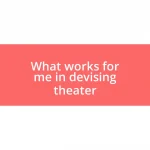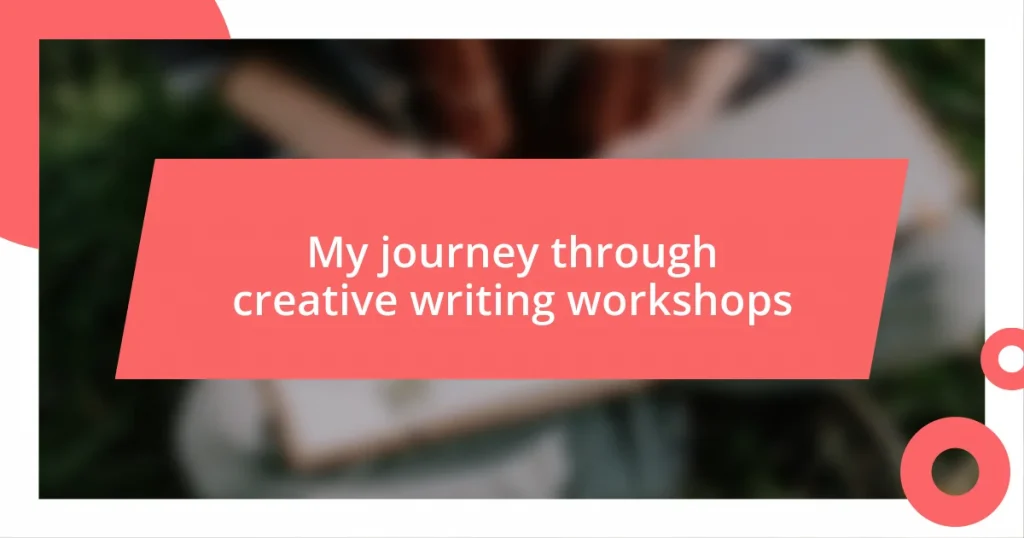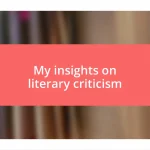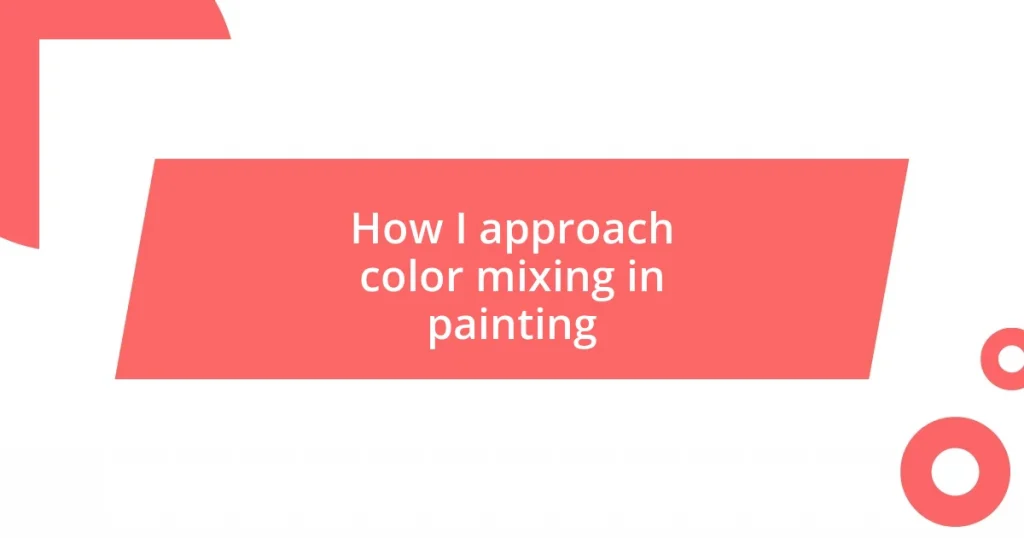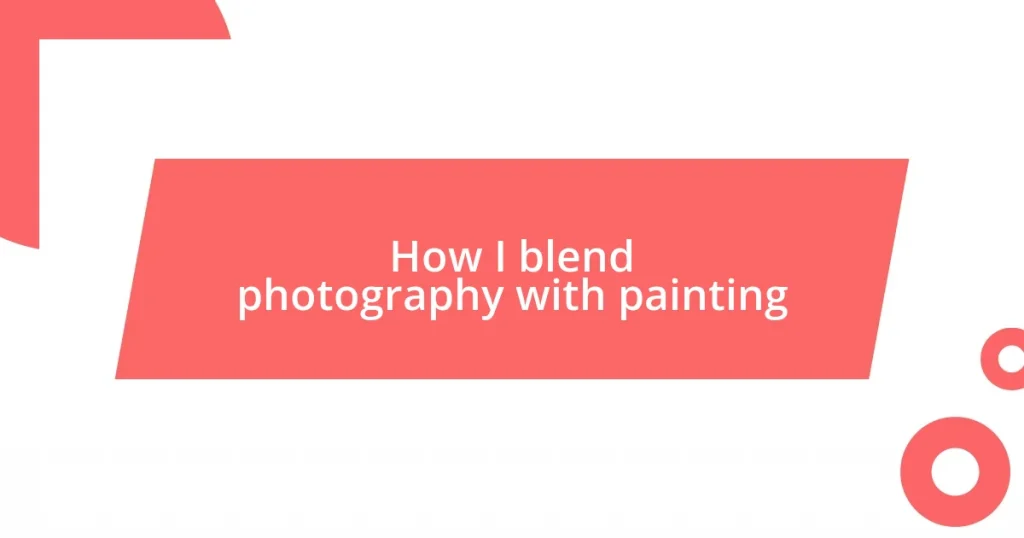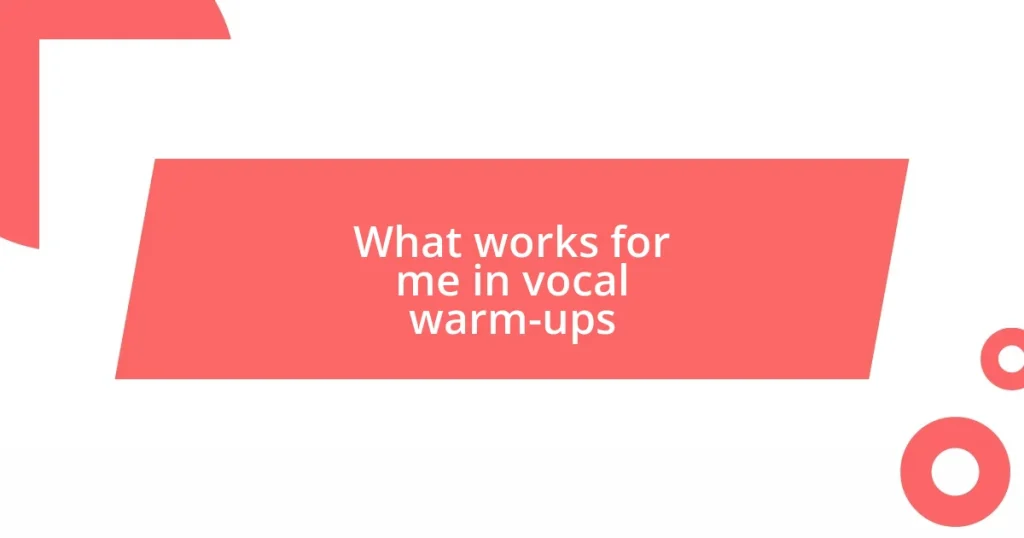Key takeaways:
- Creative writing workshops foster community, provide constructive feedback, and spark creativity, enriching the writing experience.
- Selecting the right workshop aligned with personal goals and finding an instructor who resonates with participants enhances learning and growth.
- Continuing the writing journey post-workshop involves setting aside dedicated time for writing and networking with fellow writers to maintain motivation and support.
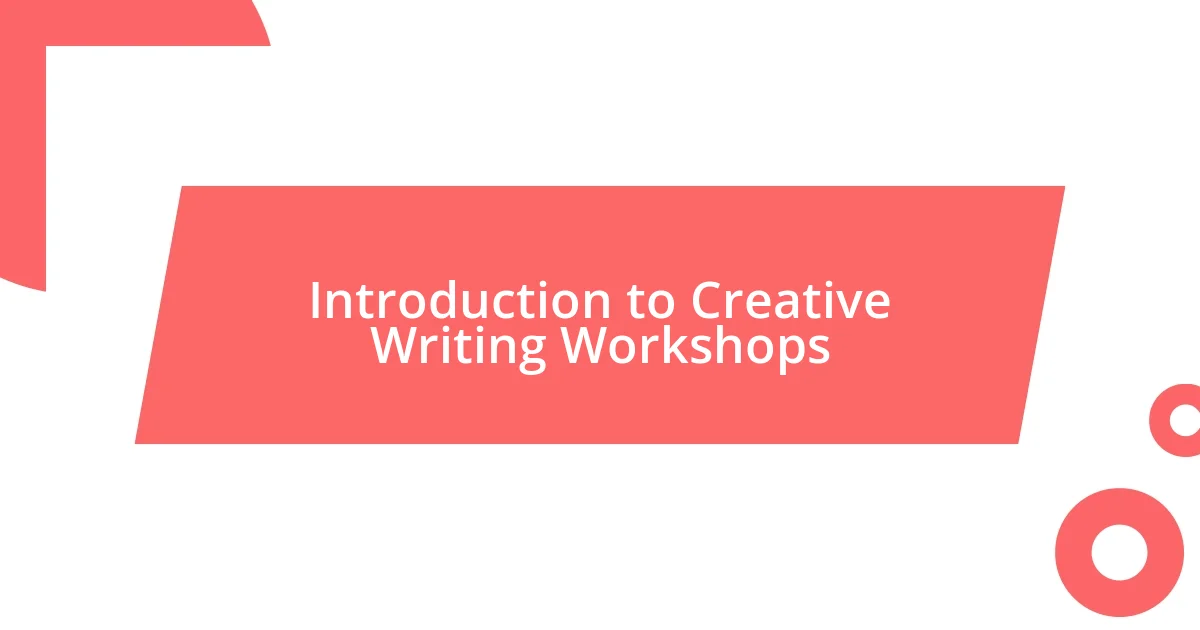
Introduction to Creative Writing Workshops
Creative writing workshops can be a transformative experience for anyone looking to delve deeper into their craft. I remember my first workshop vividly; it felt like stepping into a different world where my thoughts and emotions were not just welcomed but celebrated. Have you ever felt the weight of your stories pressing on your heart, longing to be shared?
In these workshops, you not only learn writing techniques but also connect with fellow writers who share your passion. I often found that the feedback I received was as valuable as the lessons taught. There’s something uniquely liberating about sharing your work in a room full of encouraging peers, don’t you think?
Each session unfolds like a literary journey, where ideas flow freely, sparking creativity in ways I hadn’t expected. It’s fascinating how a simple writing prompt can ignite a flurry of imagination, leading to unexpected stories that resonate on a personal level. Reflecting on my experiences, I would often think, “What if this is the piece that defines me?” This questioning fuels the creative process, making the workshops not just classes, but truly enriching experiences.
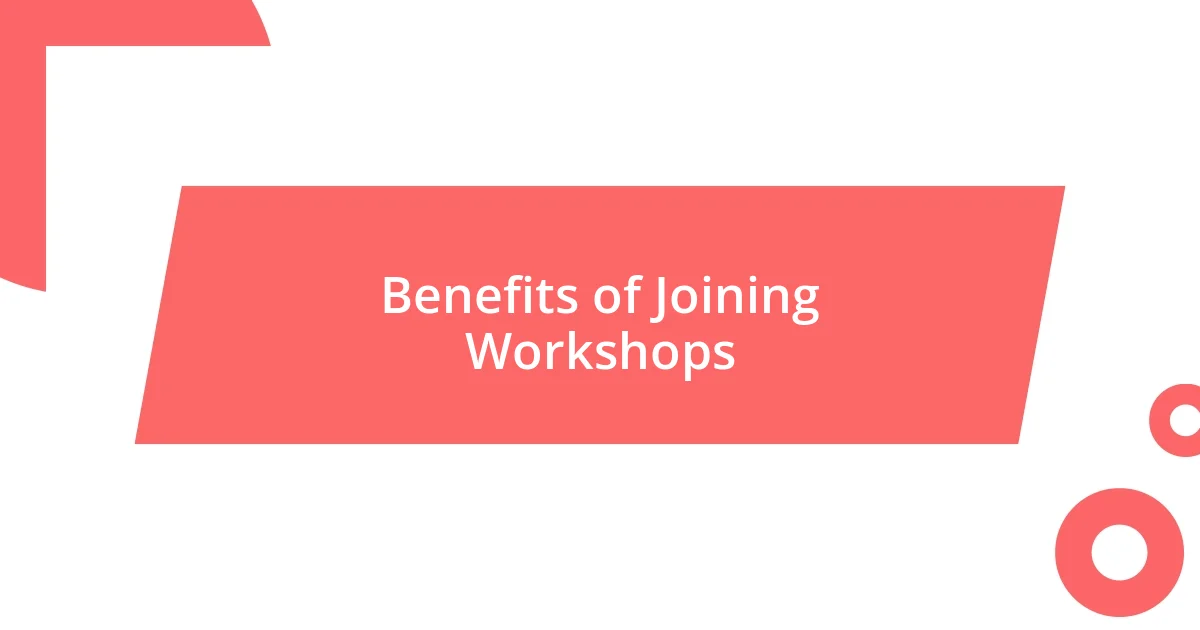
Benefits of Joining Workshops
Joining creative writing workshops provides numerous benefits that deepen your writing journey. One of the most profound advantages is the community aspect. I distinctly remember the first time I shared a piece in a workshop; the supportive atmosphere made me feel emboldened to explore themes that had long been lurking in the shadows of my mind. There’s a kind of magic in being surrounded by like-minded individuals who not only understand your struggles but actively provide encouragement and constructive criticism.
Here are some key benefits of participating in these workshops:
- Constructive Feedback: Gaining insights from peers and instructors can elevate your writing significantly.
- Skill Development: Each session is an opportunity to learn new techniques that can enhance your craft.
- Networking: Building friendships with fellow writers can lead to future collaborations.
- Diverse Perspectives: Engaging with different writing styles broadens your horizons and inspires creativity.
- Motivation: The commitment to regular writing and sharing fosters discipline and accountability in your work.
- Emotional Growth: Writing about personal experiences in a safe space can lead to profound self-discovery and healing.
Each workshop I attended was different, but they all felt like stepping stones on my path. I vividly recall how, after one session, a fellow writer shared that my piece reminded her of her own childhood experiences. It was a beautiful moment that reinforced the power of storytelling and connection, leaving me with a renewed sense of purpose.
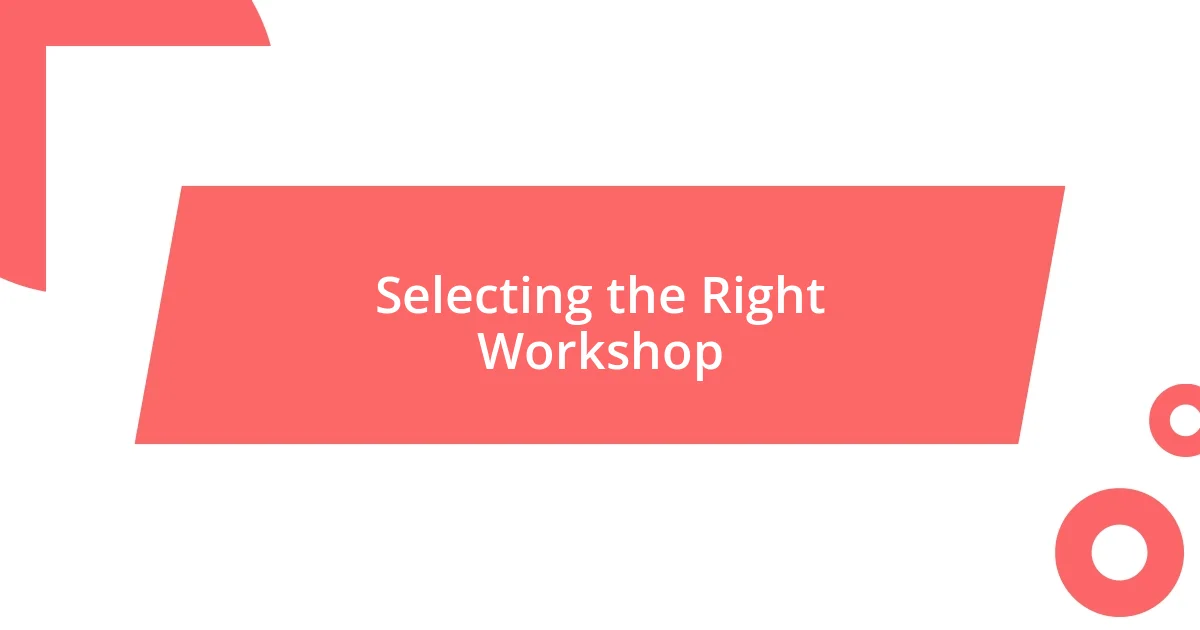
Selecting the Right Workshop
Selecting the right workshop can significantly impact your creative journey. Personally, I’ve learned that considering the focus of the workshop is crucial. Some workshops emphasize fiction, while others might concentrate on poetry or screenwriting. When I first ventured into creative writing, I mistakenly joined a poetry workshop, hoping to get guidance on my short stories. It took me a while to realize that finding a workshop aligned with my goals was essential to my growth.
Another important factor is the instructor’s style and experience. Having shared experiences with the instructor can create a more relatable learning environment. I recall engaging with an instructor who not only had impressive credentials but also shared her personal writing struggles. Her honesty fostered a sense of trust in the workshop, allowing us to explore our feelings without judgment. What’s more, the atmosphere she created encouraged vulnerability, which I found invaluable in crafting my narrative voice.
Lastly, be mindful of the size of the workshop. A smaller group tends to offer more personalized attention, while larger ones provide diverse perspectives. I remember participating in a workshop with just four attendees; it felt like a cozy gathering where each voice was given space to shine. In contrast, I’ve also been in larger workshops where it was easy to feel lost in the crowd. Finding the right balance can truly enhance your overall experience and growth as a writer.
| Factor | Description |
|---|---|
| Focus | Match the workshop’s primary genre (e.g., fiction, poetry) with your interests to maximize benefit. |
| Instructor’s Style | Choose workshops led by instructors whose experiences resonate with you for a more enriching environment. |
| Group Size | Consider the workshop size for personalized feedback; smaller groups offer more intimate connections. |
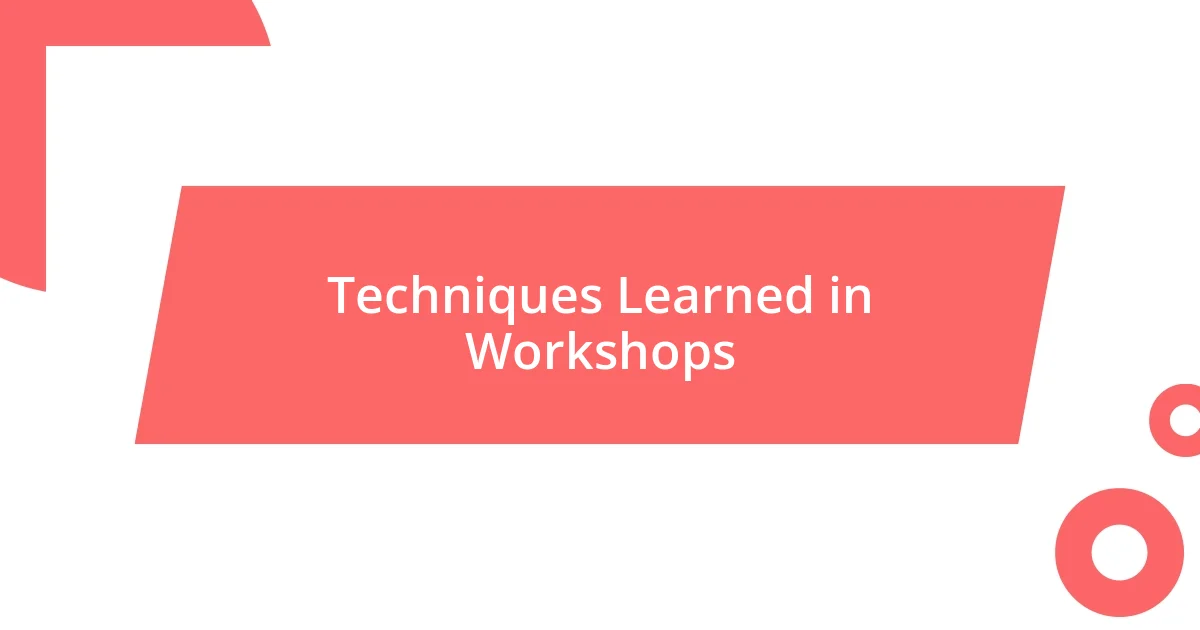
Techniques Learned in Workshops
In the workshops I attended, one technique that stood out was the use of prompts to spark creativity. I remember sitting in a circle, nervously gripping my pen, as the instructor threw out a simple phrase: “A door that leads to secrets.” In that moment, ideas flooded my mind, and I could feel the excitement of untapped stories ready to pour onto the page. It’s fascinating how a prompt can transform the mundane into something magical, isn’t it?
Another valuable lesson I learned was the importance of reading my work aloud. It may sound simple, but there’s something enlightening about hearing your words resonate in the air. I recall sharing a piece during a workshop, and as I spoke, I noticed the rhythm of my sentences. It hit me how some phrases sparkled, while others felt clunky. This vocal practice not only honed my editing skills but also deepened my understanding of pacing, which is crucial for engaging readers.
Collaborative exercises were also instrumental in expanding my writing horizons. In one workshop, we partnered up and swapped pieces for feedback. I vividly remember receiving comments that opened my eyes to new perspectives. Someone highlighted how a metaphor I’d used was intriguing but perhaps too abstract. That insight shifted my approach, reminding me of the delicate balance between creativity and clarity. Have you ever realized something fundamental about your writing through someone else’s eyes? It’s truly a transformative experience that I cherish to this day.
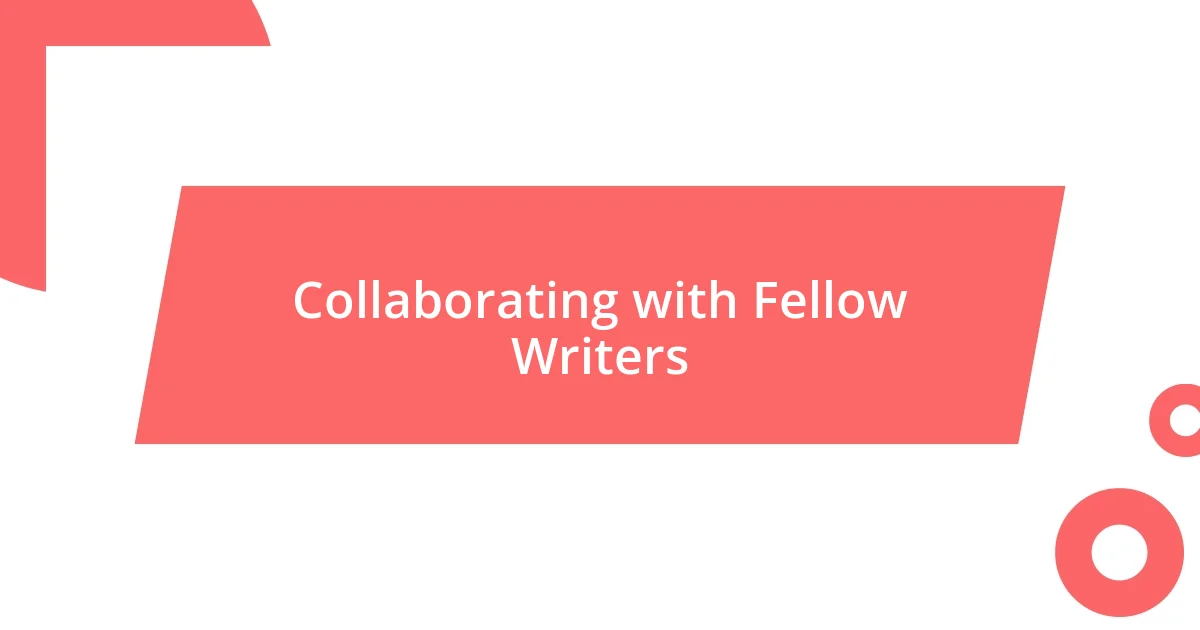
Collaborating with Fellow Writers
Collaborating with fellow writers has been one of the most rewarding aspects of my creative journey. During one workshop, we broke into small groups to share our work, and I was struck by how each writer brought their unique voice to the table. Listening to a fellow participant share their heartfelt story about loss left me feeling both vulnerable and inspired. Isn’t it amazing how exposing ourselves through our writing can create such deep connections with others?
I’ve also come to appreciate the value of giving and receiving constructive feedback. I remember a particular instance when a peer suggested a complete reworking of a character in my short story. At first, I felt defensive, but as we discussed it, I realized they pointed out something critical: my character lacked depth. That moment taught me that collaboration isn’t just about sharing ideas; it’s about challenging and uplifting each other. Have you ever had a critique that felt like a punch to the gut initially but later revealed a hidden gem?
What truly enriches the experience is the sense of community that forms among participants. One workshop ended with everyone sharing what we learned, and it felt like a celebration of collective growth. I distinctly remember one writer, her eyes gleaming with excitement, tell us how she finally found her voice through the workshop exercises. That moment solidified my belief in the power of collaboration—together, we shaped something larger than ourselves. How often do we miss out on these profound connections in our everyday lives?
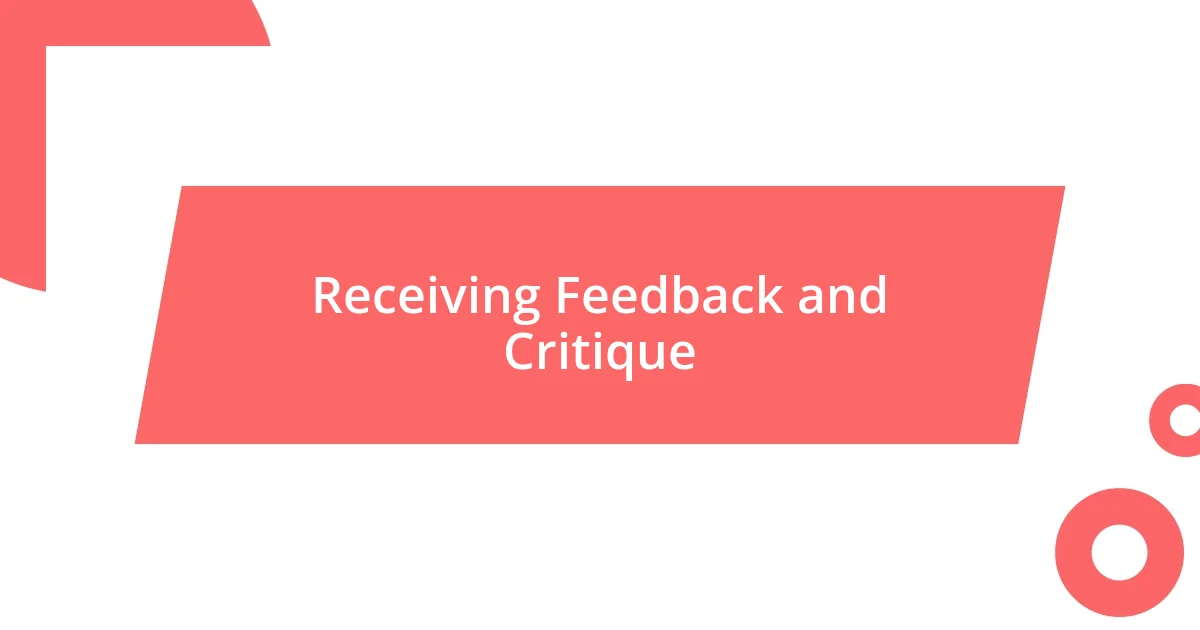
Receiving Feedback and Critique
Receiving feedback can be a nerve-wracking experience, but it’s a crucial part of the creative process. I vividly remember a moment during one workshop when I shared a poem I had poured my heart into. Listening to others dissect my words felt like vulnerability laid bare. Initially, I braced myself for harsh judgment, but what I received instead were thoughtful insights that challenged my perspective. It’s amazing how constructive criticism, delivered with care, can illuminate the strengths and weaknesses in our work.
Another time, a mentor’s feedback on a short story of mine really struck a chord. They pointed out how my protagonist’s motivations weren’t fully developed, leaving readers puzzled. At first, I felt a wave of defensiveness wash over me. However, reflecting on their comments later, I realized they were right. That discussion helped me grow not just as a writer, but as a reflective thinker. Have you ever found wisdom in feedback that initially felt uncomfortable? It’s a humbling experience that can ultimately enhance your craft.
Embracing the critique process has taught me that every piece of feedback is an opportunity for growth. I recall a workshop where participants were encouraged to provide one positive comment followed by constructive suggestions. This approach fostered an atmosphere of support, reminding us that we’re all in this together. It’s easy to get lost in the fear of criticism, but focusing on the growth potential allows us to evolve as writers. Isn’t it empowering to transform vulnerability into strength through the insights of others?
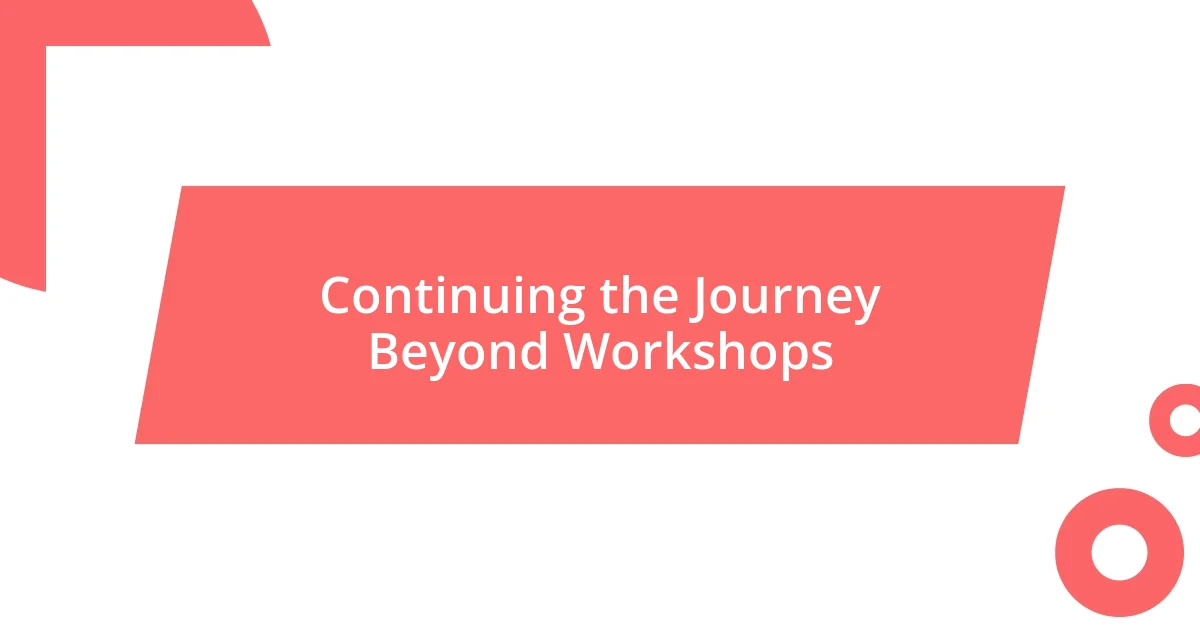
Continuing the Journey Beyond Workshops
Continuing the creative journey after workshops requires a mindset shift from participant to active creator. I remember leaving one workshop feeling invigorated, with a notebook full of ideas, but also a bit lost on how to apply everything I had learned. It hit me that the real challenge lay in taking that initial inspiration and weaving it into my daily routine. Have you ever felt that rush of creativity, only to wonder how to keep it alive in the hustle of everyday life?
One of the most rewarding steps I took was to set aside time each week for personal projects. I created a cozy writing corner in my home, a sanctuary that welcomed me back to my creative self. Each time I returned to that space, I felt like I was picking up a conversation with my writing, a dialogue honed from the insights I gained during workshops. It’s incredible what a little consistency can do—don’t you find that dedicating time to your passion can reignite your motivation?
Networking with fellow writers outside of formal settings has also been transformative. I formed a mini writing group with a few colleagues from the workshop, and we now meet monthly to share our pieces and encourage one another. I cherish those moments of laughter and vulnerability as we navigate our own ups and downs. Have you thought about the value of creating your tribe of supporters? It’s in those shared spaces that I often discover new perspectives and find the courage to take risks in my writing.






